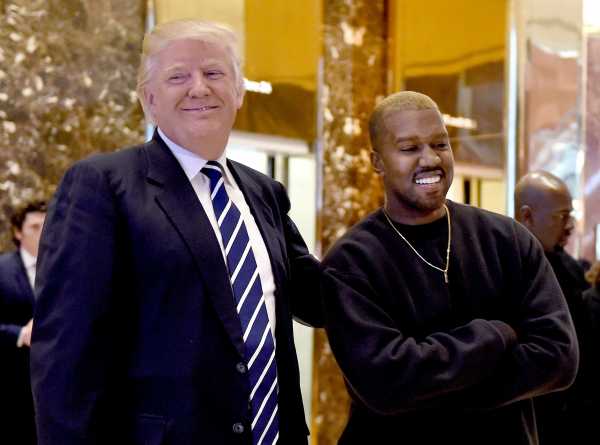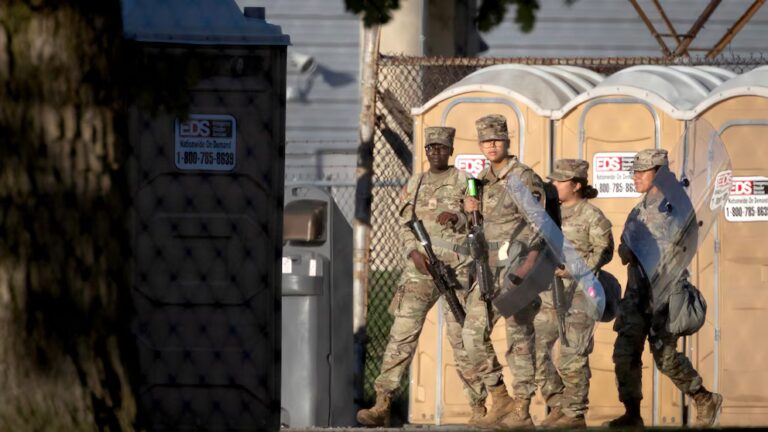
Kanye West is going to the White House.
West is expected to visit Washington on Thursday to meet with President Trump as well as White House senior adviser Jared Kushner, according to the New York Times. The Times reports that West will meet with Kushner first and will then have lunch with Trump. The meeting was confirmed in a statement by White House press secretary Sarah Huckabee Sanders.
West is expected to discuss a number of topics during his visit, including job opportunities for those released from prison, manufacturing jobs in Chicago, and gang violence. Sanders said West — who grew up in Chicago and recently announced plans to move back into the area — will also discuss “what can be done to reduce violence in Chicago,” days after Trump proposed implementing stop-and-frisk policing tactics in the city.
The Thursday meeting won’t be the first between Trump and West; the rapper previously went to Trump Tower in December 2016 to discuss “multicultural issues.” In May, West’s wife, reality TV star and entrepreneur Kim Kardashian West, met with Trump to discuss prison reform and pardoning Alice Marie Johnson, a 63-year-old black woman serving life in federal prison for a first-time drug offense. Trump commuted Johnson’s sentence, and in the months since, Kardashian West has returned to the White House to continue to lobby for prison reform.
Kanye West has become one of the president’s highest-profile celebrity supporters, and he has favorably tweeted about Trump on numerous occasions. Last month, West delivered a pro-Trump speech after a performance on Saturday Night Live. “So many times that I talk to a white person about this, and they say, ‘How could you support Trump? He’s racist.’ Well, if I was concerned about racism,” West said, “I would have moved out of America a long time ago.”
West’s upcoming visit fits into President Trump’s well-established love of celebrity advocacy
The meeting between Trump and West comes after both have regularly praised one another in tweets, with West saying that he and Trump are “both dragon energy” and calling the president a “brother.” Trump returned the praise by saying that West “has performed a great service to the black community” by openly supporting him, claiming that West’s favorable comments have helped the president’s approval numbers with African Americans (this was not actually the case).
The upcoming meeting is likely to call new attention to public criticisms of the Trump-West relationship. West in particular continues to face criticism for supporting Trump despite the president’s policy agenda being considered hostile to marginalized communities and Trump’s record of making racist remarks.
West has also faced criticism for making grossly inaccurate statements about the history of slavery and race in America, often while talking about his support for Trump.
In April, West was slammed for saying that slavery was “a choice” that resulted from black people being “mentally imprisoned.” More recently, he sparked a controversy when he called for abolishing the 13th Amendment, which ended slavery in the United States. West later clarified that he actually wanted to modify the amendment’s allowance of prison labor rather than abolish it entirely.
The meeting also highlights the continued power of celebrities in the Trump era. While other presidents have often brought celebrities to White House — Barack Obama notably invited rappers including J. Cole and Nicki Minaj to discuss criminal justice reform — these gatherings were also accompanied by policy meetings with experts.
President Trump, meanwhile, has almost exclusively relied on celebrity references from figures like Kardashian West and Sylvester Stallone, as well as input from conservative figures like Ted Cruz and outlets like Fox News, to shape his approach to aspects of the justice system like pardons. Policy meetings on prison reform and sentencing, on the other hand, have been largely left to aides and advisers like Kushner. The president has also fiercely criticized celebrities who speak out against his policies, most recently telling reporters that he likes Taylor Swift’s music “25 percent less” after her recent endorsement of Democrats running for office in Tennessee.
Not every celebrity invited to the White House has gone. For example, rapper Meek Mill, who experienced a decade-long saga with the criminal justice system, dropped out of a May discussion on prison reform, telling reporters that the event had become focused on him and Trump rather than policy.
Much of this seems to be the result of how much influence celebrities — or at least celebrities with minimal criticism of Trump himself — appear to hold in the Trump White House when it comes to matters of criminal justice. A September report from USA Today noted that the Trump administration has taken “an often chaotic, ad hoc approach to clemency.” The report added that the president “has granted pardons to people who haven’t applied for them, bypassed the formal Justice Department review process, and focused his pardon power on a handful of politically charged, high-profile cases.” While there have been efforts to create a more disciplined process, it is unclear if the president would respond positively to such a development.
Sourse: vox.com






